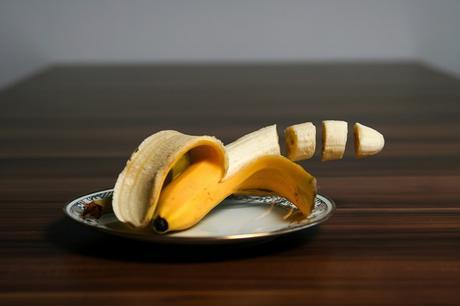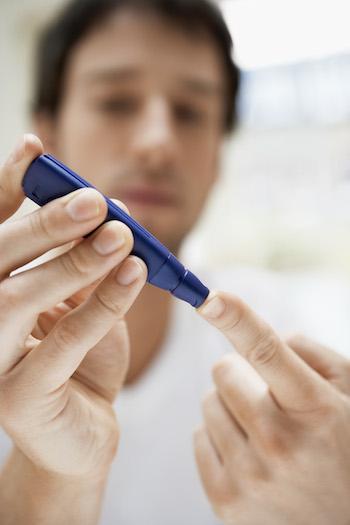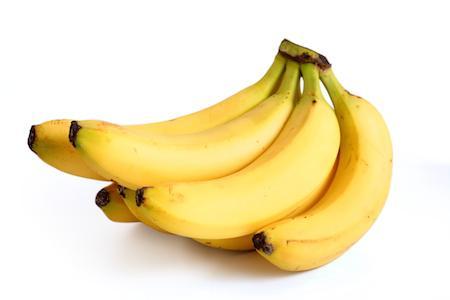
Bananas are among the most commonly consumed fruits in the world.
In the United States, people eat more fresh bananas than any other fruit, including apples and oranges, in the course of a year (1).
The reason for their popularity boils down to their great taste, convenience as a snack and overall health benefits.
Below are the top 15 benefits of bananas that are proven by scientific evidence.
1. Bananas Contain Many Nutrients and Few Calories
Bananas are a nutrient-dense fruit. According to the Dietary Guidelines for Americans established by the federal government, people should get the majority of their nutrients from fresh foods (2).
Bananas combine high levels of nutrients with very few calories. A medium-sized banana (about 7 inches long) contains only 105 calories.
Yet the same medium-sized banana also contains the following nutrients (3):
Vitamin B6 – .43 mg
This is 33 percent of the recommended dietary allowance, or RDA, for adults ages 19 to 50 (4). Vitamin B6 is beneficial for metabolic and immune function. It also helps with a fetus’ developing brain (5).
Magnesium – 32 mg
This is 8 percent of the RDA for adult women and 10 percent of the RDA for adult men.
Many of the body’s processes rely on magnesium. Magnesium helps control blood pressure, blood sugar, muscle function and the operation of the nervous system (6).
Adequate magnesium intake can also help ward off anxiety (7).
Vitamin C – 10.3 mg
This is 11 to 13 percent of the RDA for adult men and women, respectively. Bananas provide 68 percent of the RDA for children ages 1 to 3.
Vitamin C helps boost immunity, combat toxins in the body and create collagen, which is important for healing wounds (8).

Potassium – 422 mg
There is no RDA for potassium, but an intake of 4.7 grams per day is recommended for all adults. One banana accounts for about ten percent of this total.
Research shows that people in North America do not consume enough potassium.
Consuming 4.7 grams a day can help regulate blood pressure and prevent kidney stones. It can also reduce the risk of bone loss (9).
Fiber – 3.1 g
Bananas contain 8 to 12 percent of the RDA for fiber for men and women, respectively.
Fiber helps regulate blood sugar levels, improve digestion and lower the risk of heart disease (10).
Folate – 24 mcg
A medium banana contains about 6 percent of the RDA for folate for adults.
Folate is responsible for the division of cells and the creation of DNA and genetic materials (11).
One medium banana also contains about 1 gram of protein and .39 grams of fat. It also only has 1 mg of sodium and no cholesterol.
KEY POINT: High levels of vitamin B6, vitamin C, potassium, fiber, and other nutrients are found in bananas, and the fruit is low in calories, cholesterol, fat and sodium.
2. Bananas May Improve the Health of the Digestive System
Thanks to high levels of dietary fiber, the fruit aids digestion by helping food move through your digestive system more smoothly (12).
Resistant starch, one of the types of fiber in bananas, acts as food for beneficial bacteria in our guts.
It also improves gut health by stimulating blood flow, fluid absorption and electrolyte uptake in the colon (13).
The other primary type of fiber, pectin, possibly helps fight against colon cancer (14). Greener bananas contain more pectin than ripe bananas.
KEY POINT: The fiber in bananas can improve digestion, feed bacteria in the intestines and fight colon cancer.
3. Bananas Regulate Blood Sugar

In addition to aiding digestion, resistant starch and pectin help regulate blood sugar levels after eating (15).
Resistant starch moves through the digestive system without being absorbed. That means that it helps you feel full without adding calories.
Carbohydrates account for 90% of a banana’s calories. It’s important to note that these carbs start mainly as starch (in a green banana) and turn into sugars as the banana ripens (in a yellow banana).
Under-ripe bananas are lower on the glycemic index, a scale of the speed at which blood sugar levels are raised by certain foods, than ripe bananas (16).
Green bananas rate at around 30 on the glycemic index. Yellow bananas rate at around 60 (17).
Although some people believe that patients with diabetes should avoid bananas, research shows that underripe bananas are an acceptable snack (18).
The resistant starch in bananas can improve the body’s reaction to insulin, helping it to convert blood sugar to energy. This has been shown to help people with diabetes lose weight (19).
KEY POINT: Bananas are low on the glycemic index. They can help your body use sugars for energy and help you feel full longer, possibly resulting in weight loss.
4. Bananas Are Good For Your Heart
The high level of potassium in bananas supports better heart health.
Potassium lowers and regulates blood pressure. It also decreases the risk of heart disease by more than 25% (20).
Increased potassium intake has also been linked to a 24% lower stroke risk (21).
The DASH diet, a nutritional plan for people with high blood pressure, focuses on lowering the intake of sodium and increasing the intake of potassium.
Studies show that the potassium boost is especially effective for lowering blood pressure (22).
The magnesium found in bananas also supports a healthier heart. Research has found that people who are deficient in magnesium may be at a higher risk for chronic cardiovascular diseases (23).
KEY POINT: The potassium and magnesium bananas contain benefit the health of the heart.
Infographic (Pin, Share or Embed)

Share This Infographic On Your Site
<p><a href='https://www.authoritydiet.com/health-benefits-bananas-nutrition-facts/'><img src='https://www.authoritydiet.com/images/i/banana-health-hd.jpg' border='0' /></a><br /><strong>Please include attribution to AuthorityDiet.com with this graphic.</strong></p>
5. Bananas Fight Free Radicals

Bananas contain high levels of antioxidants. The most prevalent are dopamine and catechins (24).
Toxins can damage molecules and atoms in the cells, causing them to lose an electron.
These atoms and molecules become free radicals, attaching themselves to any other atoms or molecules in the body with an extra electron. This damages those particles to which they attach.
Free radical damage can lead to premature aging and many degenerative diseases. Antioxidants fight free radicals, helping improve people’s health, especially in individuals who are prone to cancer or other degenerative conditions (25).
KEY POINT: Antioxidants in bananas help prevent damage from free radicals.
6. Bananas Fight Cancer
Antioxidants found in bananas also help fight against cancer.
Catechins, one type of antioxidants in bananas, are especially effective at fighting cancerous cells. They’ve been shown to reduce tumor cell growth (26).
Riper bananas have more of a substance called tumor necrosis factor, which fights abnormal cells.
Yellow bananas with many dark spots are better than green bananas when it comes to fighting cancer (27).
Bananas also tend to promote bile acid binding in the colon (28). This can help to remove toxic bile acids from the digestive system and possibly reduce the risk of colon cancer (29).
Antioxidant administration is often used as a supplement to traditional cancer treatments (30).
KEY POINT: Antioxidants in bananas can reduce tumor cell growth caused by cancer and reduce toxins that contribute to cancer.
7. Bananas Can Improve Insulin Sensitivity
Those struggling with insulin resistance might benefit from eating more bananas. Insulin resistance may also be referred to as metabolic syndrome.
Insulin is a hormone that helps the body use the glucose that is created from the carbohydrates that you eat. Insulin helps the body use glucose for energy.
In insulin-resistant individuals, the cells don’t respond to insulin, so the glucose isn’t used as effectively for energy and may be stored as fat (31).

Insulin resistance is often considered a precursor to diabetes.
Greener bananas have been shown to increase insulin sensitivity, the healthy reaction of cells to insulin. While the exact reason for this is not yet clearly understood, it boils down to the high levels of resistant starch found in the fruit (32).
KEY POINT: Resistant starch in bananas can improve insulin sensitivity.
8. Bananas Promote Kidney Health
The average banana contains 420 milligrams of potassium.
Potassium is vital for controlling kidney health. It helps regulate blood pressure and reduce the risk of kidney diseases.
The consumption of bananas has been shown to decrease the risk of renal cell carcinoma, a type of cancer.
Researchers found that women who ate just two to three bananas every seven days were about one-third less likely to develop kidney disease (33).
People can lower their risk of kidney disease by up to 50% by eating a banana almost every day (34, 35).
People with diabetes may also experience kidney problems. One study found that eating a type of pasta made from green bananas helped prevent kidney damage in patients with type 1 diabetes (36).
KEY POINT: The potassium in bananas promotes better kidney health, reducing the risk of related diseases.
9. Bananas Promote Bone Health
Magnesium is an essential nutrient for bone health.
Bananas contain high levels of magnesium, translating into stronger and firmer bones.
Magnesium has been found to increase bone mineral density (37). The chief way that it does this is by helping the body better absorb calcium.
KEY POINT: The magnesium in bananas promotes better bone health.
10. Bananas Reduce Muscle Soreness

Yet another benefit of the potassium found in bananas is reduced muscle soreness.
Potassium is an electrolyte. It carries an electric charge and can help regulate hydration and muscle function.
When you sweat, you lose electrolytes, including potassium (38). The imbalance can result in muscle spasms and soreness (39).
This is one of the main reasons why bananas are a great post-workout meal. They reduce soreness after exercise, promote speedier recovery, rehydrate the body, and replenish electrolytes (40).
Eating a banana will also help reduce the soreness associated with a hangover (41).
KEY POINT: Bananas reduce muscle soreness thanks to the potassium they contain.
11. Bananas Boost the Immune System
Bananas are loaded with essential vitamins, minerals, and other nutrients.
Many of these nutrients, including iron, zinc, vitamin A, vitamin B6, vitamin C, selenium and protein, benefit the immune system. They ensure that the immune system is functioning properly.
Ripe bananas especially boost white blood cells’ ability to fight illness (42).
KEY POINT: Bananas contain over a dozen nutrients that maintain normal immune system response.
12. Bananas Can Prevent Asthma
Though the reason isn’t yet clear, initial studies have shown that bananas might help prevent asthma, especially in children.

These studies show that children who eat one banana every day are 33% less likely to develop asthma than those that don’t eat one banana every day (43).
More research is needed before this is 100% proven.
KEY POINT: Bananas might help prevent childhood development of asthma, although more research is required.
13. Bananas Can Aid in Weight Loss
Bananas are a great food for weight loss.
They’re low in calories, contain ample nutrients, and fill you up. Once again, it’s resistant starch that comes into play, making you feel fuller and suppressing your appetite later on (44).
Though no research has specifically linked bananas to weight loss, countless studies have shown that eating more fruits and vegetables is a viable way to lose weight (45).
Other studies show that resistant starch is an appetite suppressant (46).
KEY POINT: Bananas aid in weight loss because they’re low in calories and make you feel fuller.
14. Bananas Provide a Boost of Energy

Bananas provide a quick boost of healthy energy thanks to the vitamins and nutrients they contain.
A large banana also contains approximately 16 grams of sugar (47).
Bananas contain tyrosine, an amino acid that helps encourage alertness and motivation. When you combine that with natural sugars and vitamin B6, which helps your body use oxygen, you get an energy boost from bananas (48, 49).
Bananas are a particularly powerful source of an energy boost during exercise (50).
KEY POINT: The nutrients, including fructose, in bananas promote higher energy levels.
15. Bananas Can Improve Mood
Eating a banana can improve your mood and reduce stress.
The combination of vitamins and nutrients they contain, including vitamin A, vitamin B6, vitamin C, fiber, potassium, and iron, all contribute to a better mood (51).
The sugars that they contain provide a quick boost of energy while the fiber in bananas is a long-lasting energy source. Both improve memory, concentration, and overall mood (52).
KEY POINT: The vast array of nutrients in bananas can improve the mood by reducing stress and boosting energy.
16. Bananas Are Easy to Eat
There’s little denying that bananas are one of the easiest foods to add to your diet.
You can eat them by themselves or pair them with other nutritious foods.
Their thick skin protects them so that you don’t need a separate container to bring a banana with you as a portable snack.
Bananas also make a delicious addition to blended drinks like smoothies and shakes as well as yogurt, cereal and oatmeal.
KEY POINT: Bananas are easy to incorporate into your diet.
Do Bananas Have Any Negative Effects?
Bananas have few, if any, negative health effects.
Perhaps the only one is that they might cause an allergic reaction in some people with latex allergies.
Studies show that between 25% and 50% of people with such allergies might have an allergic reaction to bananas and other fruits (53).
For those that are concerned with blood sugar levels such as diabetics or those on a low carb diet, green bananas would be a better option.
Bananas Are Extremely Nutritious
Bananas are one of the most nutritious foods on the planet.
They’re easy to consume and are very affordable in most places. There is little reason not to add this nutritious fruit to your diet to experience the wide range of banana health benefits.
Do you eat bananas as part of your diet or for health? Let me know below in the comments.

